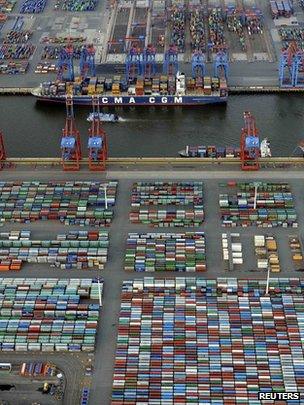Can Germany afford eurozone collapse?
- Published
- comments

As negotiations on changing the terms of the Greek rescue limp on, there remains a widespread presumption that Germany - the eurozone's paymaster - would always have too much to lose from the collapse of the currency union to allow it to collapse.
Analysis of trade patterns sent to me by Jim O'Neill of Goldman Sachs suggests that may be a slightly naive assumption. What his numbers show is that British exporters would probably be more damaged by a eurozone implosion than German ones: or to put it another way, businesses in the UK - which, to state the stunningly obvious, is not a member of the euro area - are more dependent on the health of the eurozone than German companies.
And - which is the more important trend - German businesses are becoming less and less reliant on selling to eurozone countries and are becoming more and more successful in selling to China and the leading emerging markets.
Here are the relevant stats. In 2000, roughly at the dawn of the eurozone, trade with the euro area represented 45.5% of all Germany's trade. That fell to 38.1% this year - and, according to Goldman's projections, will be under 34% in 2020.
By contrast trade with Mr O'Neill's BRICs (Brazil, Russia, India and China) was 3.9% of German trade in 2000, is just under 12% this year and is forecast to be more than 24% in 2020.
What is particularly striking is that in eight years German trade with China alone is projected to be 15.6% of the total, according to the trends, or not far off double the share represented by Germany's most important eurozone trading partner, France.
This leads Mr O'Neill to the following conclusion:
"If European policymakers cannot get their act together in the year ahead or the year after the German election [in 2013], I think the probability that it [the eurozone] survives might be less than I had previously thought."
Or to put it another way, by 2015 it will be so obvious to the German people that it is business with China that is making them richer that their incentive to show fiscal solidarity with Spain and Italy - to use German wealth to underpin the recovery of weaker eurozone economies - will be even less than it is today (for what it's worth, Goldman believes Germany's trade with Spain will be less than a tenth of its trade with China by 2020).
And what does all this betoken for the UK?
Well it rather implies that British businesses' efforts to reduce their dependence on European markets and increase their sales to emerging economies need to be significantly stepped up.
Right now, some 44.5% of British trade is with the euro area: our dependence on the prosperity of the eurozone is significantly greater than Germany's (which is why I have been banging on for years that although we may be powerless to do much to prevent the eurozone lurching from crisis to crisis, we have a great deal to lose if the lands across the Channel go splat, in an economic sense).
The better news is that our trade with China has been growing: we generated current account credits of £2.7bn in 2002, but that had risen to £13.8bn in 2011, a rise of 411%.
The rise in our sales to China were faster than our sales rise to any other major trading partner. But even so the increase was probably not fast enough.
Trade with China represents 3.5% of the British trade total, or a quarter of the business we do with the US and a third of the business we do with Germany.
Our trade with each of the Netherlands, France, the Irish Republic and Belgium is significantly greater than our trade with China.
British businesses are very dependent on selling to rich but relatively low-growth economies. They are particularly dependent on selling to economies - that like the UK itself - became far too indebted during the boom years (and to labour the point, I am talking here about the aggregate of household, corporate, banking and government debt, not government debt alone).
So it should be no surprise that the UK is struggling to grow at more than a desperately anaemic rate: the scale of the required re-engineering for the British economy will be the work of many years.
Not only does the UK need to become less reliant on debt-fuelled consumer spending, and become more of an investment-led and exporting economy, but it also needs to re-orient its trade away from economies as hobbled as Britain itself.